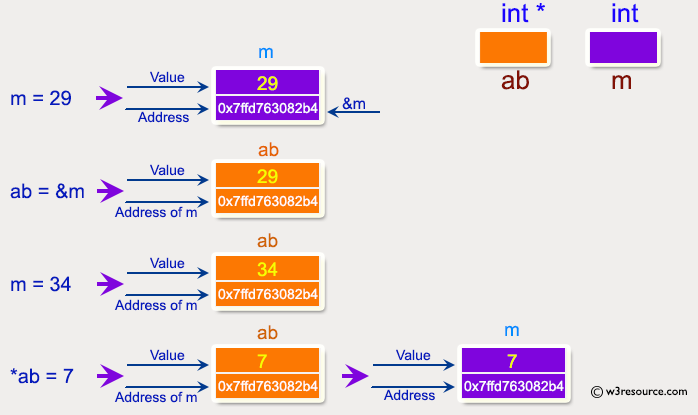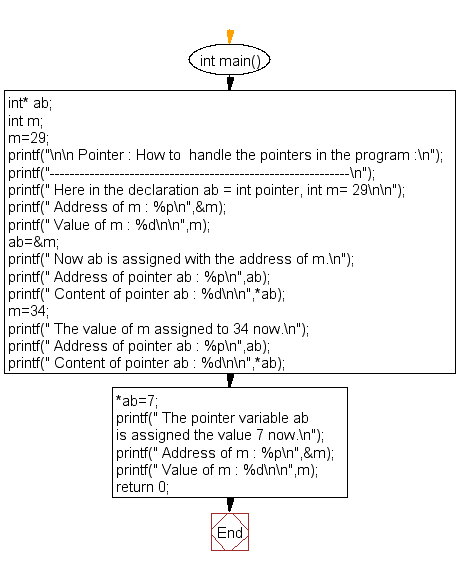C Exercises: How to handle the pointers in the program
C Pointer : Exercise-2 with Solution
Write a program in C to demonstrate how to handle the pointers in the program.
Pictorial Presentation:

Sample Solution:
C Code:
#include <stdio.h>
int main()
{
int* ab;
int m;
m=29;
printf("\n\n Pointer : How to handle the pointers in the program :\n");
printf("------------------------------------------------------------\n");
printf(" Here in the declaration ab = int pointer, int m= 29\n\n");
printf(" Address of m : %p\n",&m);
printf(" Value of m : %d\n\n",m);
ab=&m;
printf(" Now ab is assigned with the address of m.\n");
printf(" Address of pointer ab : %p\n",ab);
printf(" Content of pointer ab : %d\n\n",*ab);
m=34;
printf(" The value of m assigned to 34 now.\n");
printf(" Address of pointer ab : %p\n",ab);
printf(" Content of pointer ab : %d\n\n",*ab);
*ab=7;
printf(" The pointer variable ab is assigned the value 7 now.\n");
printf(" Address of m : %p\n",&m);//as ab contain the address of m
//so *ab changed the value of m and now m become 7
printf(" Value of m : %d\n\n",m);
return 0;
}
Sample Output:
Pointer : How to handle the pointers in the program :
------------------------------------------------------------
Here in the declaration ab = int pointer, int m= 29
Address of m : 0x7fff24a3f8bc
Value of m : 29
Now ab is assigned with the address of m.
Address of pointer ab : 0x7fff24a3f8bc
Content of pointer ab : 29
The value of m assigned to 34 now.
Address of pointer ab : 0x7fff24a3f8bc
Content of pointer ab : 34
The pointer variable ab is assigned the value 7 now.
Address of m : 0x7fff24a3f8bc
Value of m : 7
Flowchart:

C Programming Code Editor:
Have another way to solve this solution? Contribute your code (and comments) through Disqus.
Previous: Write a program in C to show the basic declaration of pointer.
Next: Write a program in C to demonstrate the use of &(address of) and *(value at address) operator.
What is the difficulty level of this exercise?
Test your Programming skills with w3resource's quiz.
C Programming: Tips of the Day
Static variable inside of a function in C
The scope of variable is where the variable name can be seen. Here, x is visible only inside function foo().
The lifetime of a variable is the period over which it exists. If x were defined without the keyword static, the lifetime would be from the entry into foo() to the return from foo(); so it would be re-initialized to 5 on every call.
The keyword static acts to extend the lifetime of a variable to the lifetime of the programme; e.g. initialization occurs once and once only and then the variable retains its value - whatever it has come to be - over all future calls to foo().
Ref : https://bit.ly/3fOq7XP
- New Content published on w3resource:
- HTML-CSS Practical: Exercises, Practice, Solution
- Java Regular Expression: Exercises, Practice, Solution
- Scala Programming Exercises, Practice, Solution
- Python Itertools exercises
- Python Numpy exercises
- Python GeoPy Package exercises
- Python Pandas exercises
- Python nltk exercises
- Python BeautifulSoup exercises
- Form Template
- Composer - PHP Package Manager
- PHPUnit - PHP Testing
- Laravel - PHP Framework
- Angular - JavaScript Framework
- Vue - JavaScript Framework
- Jest - JavaScript Testing Framework
